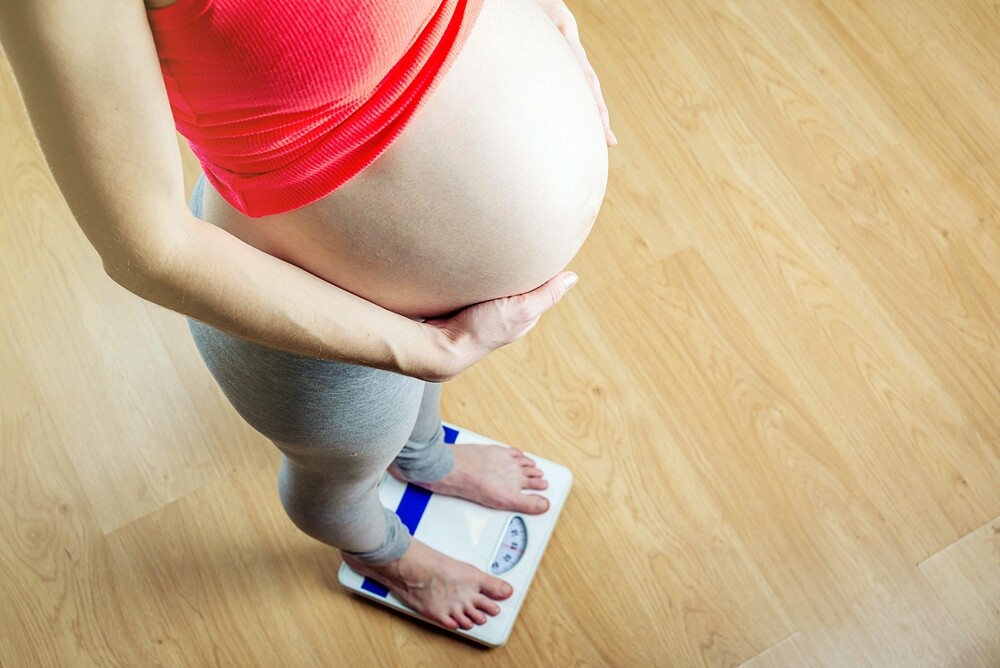Women can put on a lot of weight during pregnancy up to and including birth. But how much is normal? And what do you need to know about weight gain during pregnancy? We enlighten!
Weight gain in pregnancy: You must know that!
- During pregnancy you need about ten percent more calories. This is not much in effective terms and is already covered by an additional fruit muesli, for example. So the saying “eat for two” is not true.
- The average recommended weight gain until the end of pregnancy is about 12 kilograms. In principle, however, the initial weight before pregnancy must be taken into account, which results in various deviations and, depending on the initial weight, 10 to 18 kilograms of weight gain is normal.
- The recommended weight gain during pregnancy is calculated based on the Body Mass Index (BMI) before pregnancy:
Underweight (BMI < 18.5): 12 to 18 kilograms weight gain during pregnancy.
Normal weight (BMI 18.5 to 24.9): 11 to 15 kilograms weight gain during pregnancy
Overweight (BMI 25 to 29.9): 6 to 11 kilograms weight gain during pregnancy
Obesity (BMI > 30): 5 to 9 kilograms weight gain during pregnancy
Note: In twins the weight gain can be between 15.5 and 20 kilograms.
How do I calculate the BMI? Here you can find our free BMI calculator: All you need is your height and weight before pregnancy.
What causes the weight gain?
The additional weight of a pregnant woman until birth is made up of the following factors:
- Child: about 3500 grams
- Placenta: about 750 grams
- Uterus: about 1000 grams
- Amniotic fluid: about 1300 grams
- Fluid accumulation: about 2000 grams
- Increase in blood volume by about 1150 grams
- Stored fat deposits: approx. 1700 grams
- Total breasts: up to 600 grams
This would result in a total weight increase of 12 kilograms. However, these values may vary slightly.
Weight gain in pregnancy after months
How much women gain during pregnancy is always individual and depends on the initial weight. To keep an eye on your weight, you can weigh yourself once a week on a set day, preferably before breakfast. The following values can provide a small guide to weight gain during pregnancy:
- 1 to 16 weeks of pregnancy: about 2 kg
- 17 to 22 weeks of pregnancy: about 2 kg
- 23 to 26 weeks of pregnancy: about 2 kg
- 27 to 35 weeks of pregnancy: approximately 500 grams per week
- 35 to 40 weeks of pregnancy: about 350 grams per week
Weight gain in pregnancy: Are deviations normal?
Deviations are quite normal and can occur. Especially at the beginning of the pregnancy a slight weight loss can occur. The reason for this is morning sickness or lack of appetite. Your gynaecologist will check your weight regularly and note it in your maternity record.
Any noticeable changes should be checked by a doctor immediately:
- If you put on more than 2.5 kilograms per week, a gesture can be the cause.
- If your weight remains constant for a long time in the last two trimesters, this could be an indication of illness or malnutrition. It could also be a sign of growth retardation in the child.
- The weight gain should not be less than 7 kilograms at the end of pregnancy, otherwise the growth of the baby could be in danger.
- If you gain more than 20 kilograms during pregnancy, incorrect eating habits may be the cause.
How does being overweight or underweight affect your pregnancy?
- Being overweight during pregnancy increases the risk of pregnant women suffering from gestational diabetes and high blood pressure. This can lead to pregnancy complications. Gestational diabetes, for example, carries risks for the baby and can affect growth. An appropriate examination for gestational diabetes is therefore carried out between 26 and 28 weeks of pregnancy.
- Being underweight can also have various effects on your baby’s development and, for example, increase the risk of premature birth. In this case, you should therefore make sure you eat a balanced diet.
- Basically, a balanced diet during pregnancy is very important to provide your baby with nutrients. Diets carried out independently could harm your child. Consult your doctor if you have questions about eating habits or if you are underweight or overweight.

